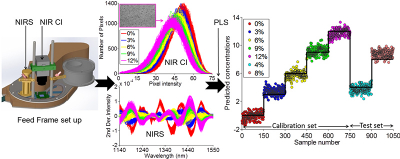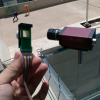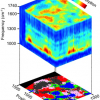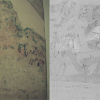
Process Analytical Technology (PAT) has been of great value to pharmaceutical manufacturing, enabling testing throughout the manufacturing process and allowing the real-time release of the finished product. Often, the final step in the production is tableting. In this, a die used to compress the tablet is filled with powder via a feed frame, that ensures a constant supply of material. The powder contains the active pharmaceutical ingredient (API) as well as other material required for the production of the tablet. Subject to the mechanical processes within the feed frame, the consistency of the powder varies due to density variations and segmentation. Such inconsistencies can lead to differences in concentrations of the API in individual tablets. Too much or too little API in a tablet are each dangerous for the patient taking the medicine.
These variations in powder flow phenomena in pharmaceutical manufacturing feed frames have previously been investigated with near infrared (NIR) spectroscopy. However, whilst this has provided useful information, due to the comparatively small area analysed with this technique, areas of segregation can be missed. In a paper published in the Journal of Spectral Imaging (doi: https://doi.org/10.1255/jsi.2018.a5), the authors report on the use of NIR chemical imaging for in-line feed frame monitoring. They show that NIR chemical imaging based predictions of concentration in a feed frame may prove to be more representative, since they gather information from a comparatively larger sample area compared to NIR spectroscopy.
According to Ryan Gosselin, Associate Professor in the Department of Chemical Engineering and Biotechnology Engineering of the Université de Sherbrooke, Québec, Canada, “concentration predictions with NIR chemical imaging were found to be similar to those of the NIR spectroscopy model. However, NIR chemical imaging is better positioned to view concentration modifications over larger sample areas, and different image sections can be analysed separately in the event of localised concentration changes.”




